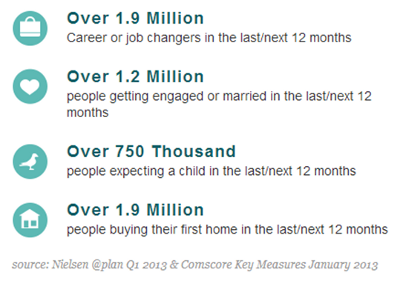You are viewing our site as an Agent, Switch Your View:
Agent | Broker Reset Filters to Default Back to ListA Guide to Paid Online Marketing, Part I
September 08 2013
 The ListHub team tours the country to provide educational seminars about listing distribution and online marketing, and each time we visit brokers and agents all over the country, we ask, "How many of you receive constant phone calls from sales reps at Zillow, Trulia, and realtor.com® about spending money on advertising?"
The ListHub team tours the country to provide educational seminars about listing distribution and online marketing, and each time we visit brokers and agents all over the country, we ask, "How many of you receive constant phone calls from sales reps at Zillow, Trulia, and realtor.com® about spending money on advertising?"
The hands in the room all fly up.
The ListHub network alone includes over 60 national real estate search websites, with a combined total network of more than 900 websites for listing display. A lot of real estate search websites offer opportunities to enhance your listings, or advertise, to attract more buyers. With all of those options how do you decide the best place to enhance your listings?
In this two-part article, we've put together some questions to consider when exploring online advertising opportunities.
1. Who is the target audience of the website?
Each website attracts a unique audience. For example, only 3% of online consumers who visited Zillow also searched on AOL Real Estate. When considering where to enhance your listings online, one of your first questions should be "Who is the target audience that will be viewing my listings?"
According to comScore, 43% of Trulia's audience consists of first-time buyers, which is good, considering 39% of homebuyers in 2012 were first-time buyers. However, if you are selling luxury real estate properties, your target audience is probably not young professionals, first-time buyers, or people whose median household income is under $50,000 a year. You can save a lot of time up front by knowing the audience and making sure they would be good "potential buyers."
Most websites will have information about their target audience readily available, including basic demographic information like the median age, gender, household income, marital status, etc. This information is usually available on the company's website or in their media kit.
Some media kits may also contain psychographic information (no - not whether their audience is crazy or not!). Psychographic data includes factors about the consumer's personality, values, attitudes, interests, and lifestyles. Demographics generally define "who" the potential buyer is, while psychographics paint the picture of "why" the consumer is motivated. Are they interested in travel? Did they recently get engaged? etc.
Here is an example of how realtor.com® defines their audience with psychographic data.

2. How do they promote their website to attract more visitors and get more leads for your listings?
Most advertising contracts require a year-long commitment, and are expensive! If you are investing your hard-earned marketing dollars on enhancing your listings online, don't you want to make sure the website is also investing their marketing dollars on promoting their site?
You may have noticed recently that a lot of the big players in real estate consumer search are launching aggressive marketing campaigns to attract more people to their website. It is an extremely competitive market, and each site is pulling out the big guns to drive traffic and grow their audience.
Zillow launched its first ever television ad in 2012, and in the upcoming year it plans to spend up to $30 million dollars marketing its website. Realtor.com® also unveiled a newly branded website this year and launched the "Find It First" digital campaign, its first major online consumer marketing initiative. The "Find It First" campaign featured digital ads on major online publications like the New York Times' and the Wall Street Journal's real estate section. Real estate search sites are also using email marketing and social media to reach more consumers.
If you are going to make the investment in online advertising, be sure that the site you choose is also invested.
3. Does the website have a mobile site or application?
You are probably reading this post on your phone or tablet, right? Well if you aren't today you probably will be by next year. According to a report by Morgan Stanley, the number of Internet-connected mobile devices (i.e., smartphones and tablets) will exceed the number of desktops and laptop computers in the next year.
Online consumers are actively searching for real estate from their mobile devices; therefore it makes sense to have your listings there. This year Zillow recorded that 93 homes were viewed per second on mobile devices, Trulia's mobile monthly visitors were up 122%, and HomeFinder.com's mobile traffic makes up 40% of the sites total traffic.
Other questions to ask include:
- Will your enhanced listings or ads also be promoted on the mobile app? (Don't assume--you know what they say about that!)
- How will the ad be displayed?
- How will mobile consumers reach you, or learn more about your listings?
- Does your package include your own mobile site for your listings? (Some do, so ask!)
Tell ListHub About Your Online Marketing Strategy
Take this short survey to help us learn more about your online marketing strategy. What sites do you advertise on? How do you decide where to advertise? What other questions do you have about online marketing?
Look for Part II of A Guide to Paid Online Marketing next month!









